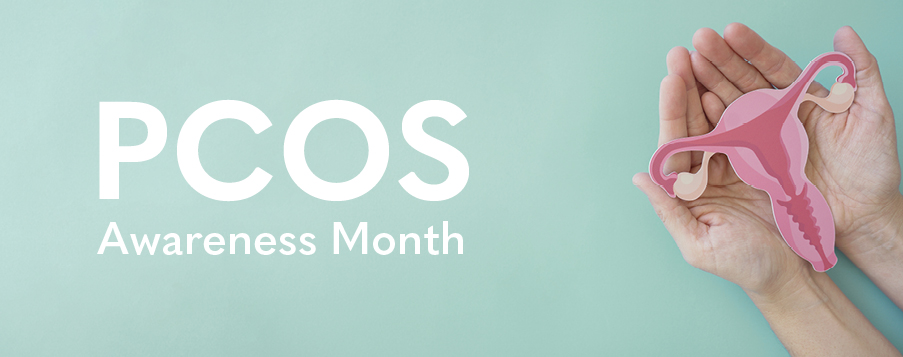11/09/2024
September is PCOS Awareness Month, a time to shed light on Polycystic Ovary Syndrome (PCOS), a hormonal condition affecting millions of women worldwide. Despite its prevalence, PCOS remains undiagnosed and often misunderstood, making awareness efforts vital for early detection and effective management. In this blog, we will delve into the common symptoms of PCOS, its impact on health, available PCOS testing options, and various management solutions.
What is PCOS (Polycystic Ovary Syndrome)?
PCOS is a hormonal disorder that affects women of reproductive age. It is characterised by the presence of multiple cysts in the ovaries and hormonal imbalances that can lead to numerous symptoms and health complications. When asking what is PCOS, it is important to consider both the physical and hormonal aspects.
The precise cause of PCOS is not fully understood, but it is thought to involve a combination of genetic and environmental factors. Hormonal imbalances, particularly an excess of androgens (male hormones) like testosterone, play a significant role in the development of PCOS.
PCOS affects about 1 in 10 women, making it one of the most common endocrine disorders in females. While prevalence may vary across different populations, it is estimate that around 5-10% of women in the UK are affected by this condition.
Symptoms of PCOS
Understanding the symptoms of PCOS is key. PCOS manifests through various symptoms that can differ in severity from person to person.
Irregular Periods: One of the key symptoms 0f PCOS is irregular menstrual cycles. Women with PCOS may experience infrequent, prolonged, or absent periods. This irregularity is often the first noticeable symptom and is caused by hormonal imbalances that disrupt the normal ovulation process.
Excessive Hair Growth (Hirsutism): Due to elevated testosterone levels, women with PCOS may notice increased hair growth on their face, chest, back, or other areas of the body. This can cause feelings of self-consciousness and may require treatments such as laser hair removal or medication.
Acne and Oily Skin: Hormonal imbalances in PCOS can lead to increased oil production in the skin, resulting in clogged pores and the development of acne. Managing this symptom may involve a combination of skincare routines, medications, and lifestyle changes.
How does PCOS Affect Hormonal and Physical Health
PCOS can impact various aspects of a woman’s health, including fertility, metabolism, weight, and mental health.
Fertility Issues: PCOS can lead to fertility problems due to irregular or absent ovulation, making it challenging for women with PCOS to conceive. However, with appropriate treatment and support, many women with PCOS can still achieve successful pregnancies.
Metabolic Syndrome and Weight Gain: Insulin resistance is a common feature of PCOS, which means that the body has difficulty using insulin effectively. This can lead to high blood sugar levels, weight gain, and an increased risk of developing Type 2 Diabetes. It is important for women with PCOS to adopt a healthy lifestyle, including regular exercise and a balanced diet, to manage these metabolic challenges.
Mental Health Implications: Women with PCOS are more likely to experience depression, anxiety, and low self-esteem. The hormonal imbalances and physical symptoms of PCOS can take a toll on emotional well-being. Seeking support from healthcare professionals, such as therapists or counsellors, can be beneficial in managing these mental health concerns.
Diagnosis and PCOS Testing
Diagnosing PCOS requires a comprehensive approach that includes clinical evaluation, medical history, imaging, and various blood tests to confirm the presence of PCOS and rule out other conditions with similar symptoms.
Hormone Blood Tests: Hormonal imbalances are a key factor in PCOS. A hormone blood test will measure hormone levels, such as testosterone, luteinising hormone (LH), follicle-stimulating hormone (FSH), and anti-Mullerian hormone (AMH). These tests help assess the hormonal profile and confirm the presence of PCOS.
It’s important to note that PCOS diagnosis requires a comprehensive approach, considering both physical symptoms and test results.
Management and Treatment Options
Various management and treatment options are available to help women effectively manage their PCOS symptoms and improve their overall well-being.
Lifestyle Modifications and Diet: Making certain lifestyle modifications and following a healthy diet can greatly help in managing PCOS symptoms.
Medications: Depending on the specific symptoms experienced, healthcare providers may prescribe medications to help manage PCOS. Birth control pills are often prescribed to regulate menstrual cycles and reduce symptoms such as acne and excess hair growth.
At Randox Health, we understand the impact that PCOS can have on women’s lives. Our comprehensive PCOS test and comprehensive health checks can help identify potential risk factors, monitor hormone levels, and provide valuable insights into overall health & well-being.



